Uni of Nottingham sides with weapons companies, closes down pro-Palestine camp
The University of Nottingham has gone to extremes to stop the pro-Palestine encampment that was established on campus, refusing to even engage with protesting students. But the fight is not over for the demonstrators.
-
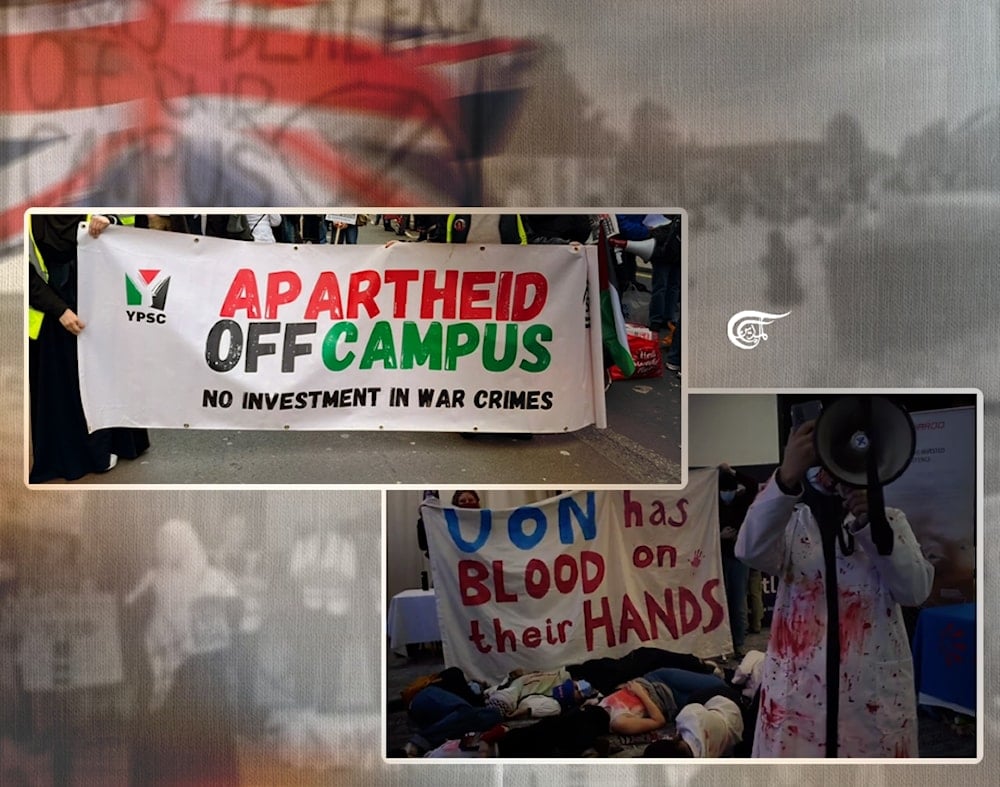
The physical space is gone but the energy is still here. The camp was just one aspect of our campaign. (Al Mayadeen English; Illustrated by Batoul Chamas)
-
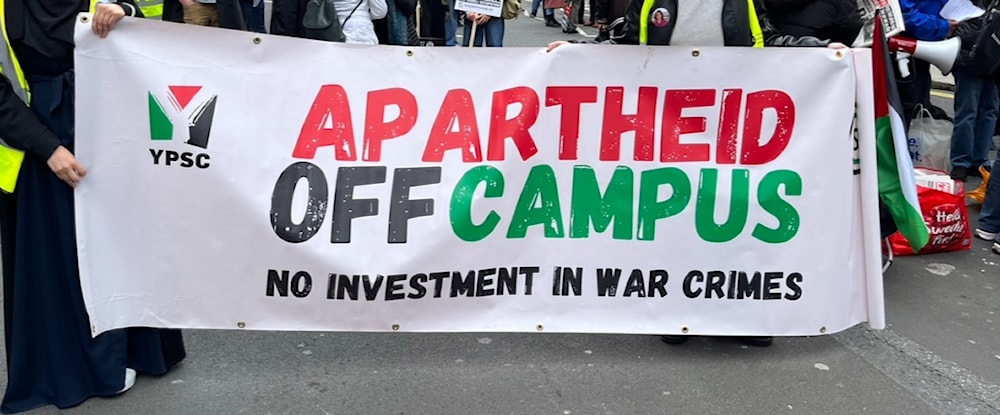
(Source: Sul Nowroz 2023)
Shelton Street, located in London’s Covent Garden, is a short, narrow road. It is lined by neat buildings, three storeys high made from reddish bricks. It is quiet, with only a handful of offices and little vehicle traffic. Not much happens there.
On August 5 this year, that changed. The small street was thrust onto the world stage after the occupants at number 75, the British Society for Middle Eastern Studies (BRISMES), issued an alarming press release about mounting oppression and censorship at UK universities.
BRISMES was founded in 1973, and with 500 members provides "a forum for educators and researchers in Middle East Studies." Its staff are topflight academics from the London School of Economics (LSE), the School of Oriental and African Studies (SOAS), and the universities of Exeter, Glasgow, Oxford, St Andrews, Warwick, and York. On the morning of Monday August 5, BRISMES issued a two page, 640-word press release accusing UK universities of suppressing student opposition to "Israel’s" genocidal onslaught on Gaza:
"[BRISMES] Condemns the recent wave of repression by university administrations directed at students involved in encampments and other protests opposing Israel’s war on Gaza."
The press release listed three specific tactics used against students: disciplinary action, the unnecessary use of force, and the threat of costly litigation.
Rolls Royce, BAE Systems and the University of Nottingham
-
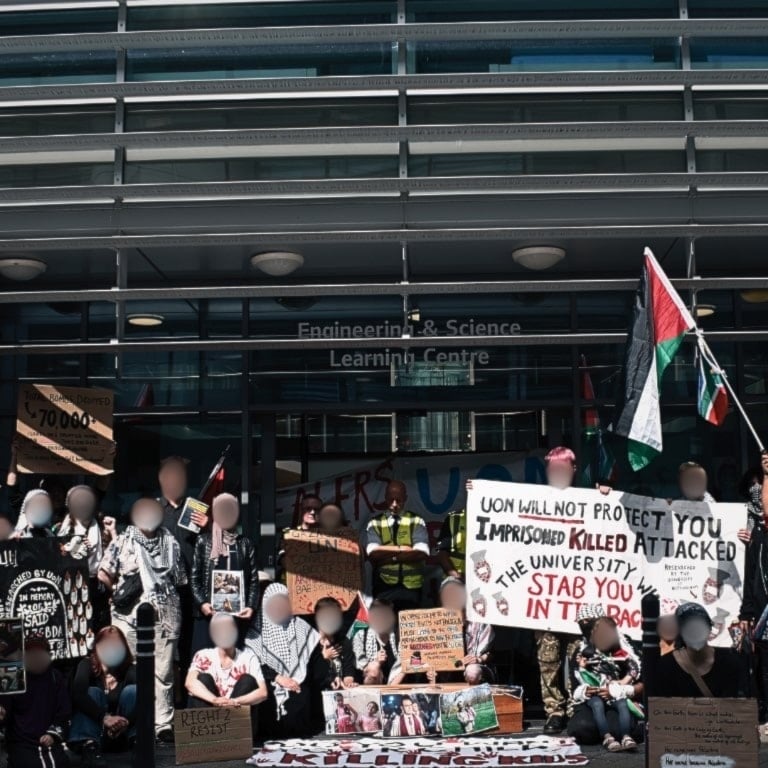
(Source: @demilitariseuon)
Rolls Royce are well known for building luxury cars. A 2024 Spectre will cost you a cool $520,000, a 2024 Cullinan a little less at $450,000. But the company is lesser known for its dishonest business practices. In 2017, the UK’s Serious Fraud Office and Rolls Royce entered into a Deferred Prosecution Agreement (DPA). DPAs were introduced in 2013 and allow the UK government to negotiate a penalty with an organisation suspected of an economic crime, such as bribery or fraud, rather than undergo a costly trial. Some suggest DPAs also let companies off the ethical hook as most penalties are affordable.
The Rolls Royce DPA covered a 12-count indictment including offences of "conspiracy to corrupt, false accounting and failure to prevent bribery." The fine was approximately $650 million, the largest financial penalty imposed on a company for criminal conduct in the UK. The alleged offences were across multiple jurisdictions and divisions, including energy, aviation, and defence.
Rolls Royce builds engines and power units for a range of land, air and sea based military vehicles. It boasts having "16,000 military engines in service with 160 customers in 103 countries," which puts it on track to be the world’s 23rd largest defence company in 2024. It includes "Israel" (who is enacting a genocide in Gaza where almost 200,000 people have been slaughtered) and the Kingdom of Saudi Arabia (who is waging an illegal war on Yemen where almost a quarter of a million people have been murdered) amongst its customers.
According to Defence News, the world’s 7th largest defence company is BAE Systems. With a workforce of 100,000 people in over 40 countries, BAE provides security solutions to "those who serve and protect us." Their web site lists 11 ways in which they play an "Important role in society," but omits to mention they deal in death.
Action on Armed Violence (AOAV) is a London-based charity that monitors and records armed violence against civilians. In April of this year, they released a report titled How BAE Systems Helped Arm Half the World, which states BAE directly supplies 81 countries with weapons and military systems, including 29 whose military actions have injured or killed civilians, 13 who are on the UK’s human rights abuse watchlist, nine who have experienced one or more military coup d’états over the past decade, and one, "Israel", who is on trial at the International Court of Justice on allegations of genocide. BAE itself has a case pending at the International Criminal Court accusing it of being complicit of war crimes in Yemen.
It is a distinctive building, once seen not easily forgotten. Three storeys high, the upper two clad in anodised golden panels pierced with long vertically stretched windows, the Advanced Manufacturing Building at the University of Nottingham (UoN) is a talking point. Shunning conventional form, the overtly masculine structure is an overdose of right angles and straight, rigid lines, excessively high ceilings and tall, towering roofs. There is little that is human or humble about this building.
The facility is home to multidisciplinary teams who research and develop new technologies and systems of production in several sectors including automotive, power engineering and defence. Rolls Royce and BAE Systems partly fund the facility (to the tune of $60 million), and the collaboration has triggered heated debate about the ethics of UoN’s involvement in the military-industrial complex, and indirectly its possible complicity in war crimes. Sadly, UoN is not alone. A February 2023 study by Declassified UK, found British universities received approximately $650 million in research funding from the arms trade, and “these kinds of partnerships change the way that education is oriented” concluded the study.
While there has been a student led effort to demilitarise UoN for over a decade, the recent Israeli led genocide on Gaza has brought a renewed sense of urgency and a sharpened focus to the campaign.
Genocide, The International Criminal Court and Yoseph Haddad
It was as frightening as it was incriminating. On October 9, 2023, "Israel’s" Security Minister Gallant, dressed in black, macabrely informed the world that "Israel" was about to illegally lay siege to Gaza in an attempt to squeeze the life out of it – all life, from Resistance fighter to civilian, from adult to child. Nothing was to be spared.
"We are imposing a complete siege on Gaza. There will be no electricity, no food, no water, no fuel. Everything will be closed. We are fighting human animals."
The brag served as public testimony of "Israel’s" intent to deliberately kill a large number of people from a particular nation, or ethnic group, with the aim of destroying that nation or group. It was a textbook definition of a genocide. To remove any doubt a cast of Israeli ministers, government officials and military leaders went on record making similar claims. In the months that followed, Israeli occupation forces (IOF) unleashed a living hell on Gaza, including round-the-clock bombing, indiscriminate shelling, arrest, detention and torture of civilians, laying siege to hospitals, missile attacks on schools, and drone attacks on refugee settlements in declared safe zones.
UoN students were quick to mobilise in solidarity with Palestinians, holding rallies and marches and staging a die-in at the university’s career fair, where 18 companies linked to the arms trade had been invited. They walked out of lessons and occupied buildings, blocked entrances to management offices and held vigils.
-
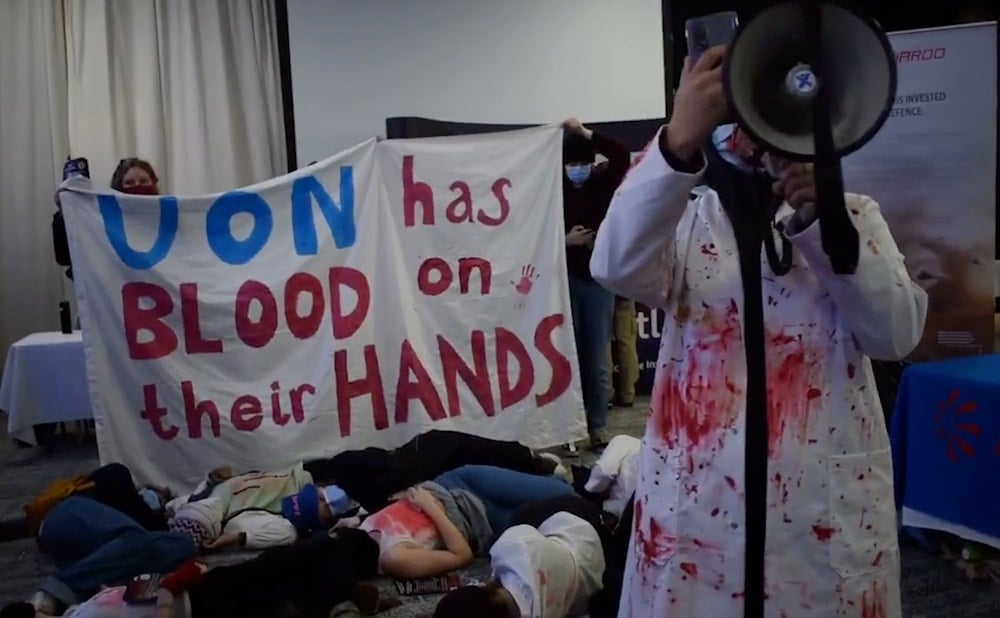
Die-in at careers fair. (X Screengrab @NottsSolidarity)
A list of demands of UoN was drawn up, including ending all partnerships with arms companies and Israeli academic institutions, supporting free speech and protest on campus, and committing to rebuild the Palestinian education sector, as well as provide bursaries and scholarships to Palestinians. The requests were comparable to those undertaken by the university when Russia invaded Ukraine. In March 2022, the University Executive Board determined that the "University of Nottingham will end all formal links with universities in Russia, including current research projects, bilateral agreements, memoranda of understanding and any projects currently under development."
The Executive Board went on to confirm the university "was exploring how we [University of Nottingham] can enable students and postgraduate researchers from Ukraine to study with us in the UK."
Affected students were provided a 24x7 hotline to help with their mental health and wellbeing, and the Board endorsed three charities that were providing humanitarian support to Ukraine. When it came to similar demands for Palestine, the university administration didn’t engage.
On the contrary, in early December 2023, a small number of students held a non-violent sit-in at one of UoN’s auditoriums. They sat peacefully on the floor, protesting the university’s continued complicity with arms companies supplying "Israel". The university’s response was swift and physical: the students were forcefully carried out of the building by private security. Later that month, the Marxist Society of University of Nottingham was threatened with suspension for using the slogan "Intifada until victory."
In February, after the International Criminal Court had ruled a genocide in Gaza plausible and issued special measures against "Israel", the university invited Yoseph Haddad to speak on campus. Haddad, a controversial figure, and ex-IOF member (Golani Brigade) is a committed Zionist with close links to the Israeli government. A month after his UoN address, he posted a video of him defacing a London mural honouring Palestinian journalist Hind Khoudary.
Nottingham Camp for the Liberation of Palestine
-
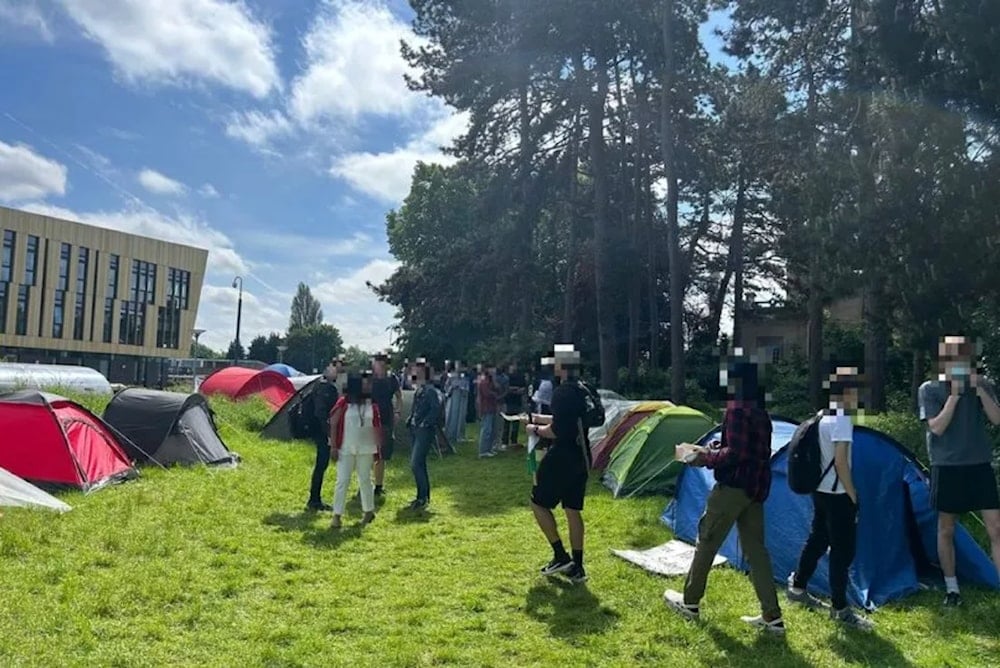
(Source: Nottingham Post)
“Students repeatedly tried to engage with the administration between October and May, but our options were exhausted. There was no meaningful dialogue and the genocide continued,” recalls one camp member.
“We approached the Student Union for support multiple times, but management and some full-time officers were unresponsive, and at times even hostile.”
UK student unions are strange entities. They are assumed to be independent, yet receive a large part of their funding from their university. Many have suggested this conflict of interest is why student unions have historically struggled to deliver real change, and this vacuum is increasingly filled by self-organising, single issue student movements.
The Nottingham Camp for the Liberation of Palestine (NCLP) was set up on May 10, 2024, on the grassy patch of Jubilee Campus, directly opposite the Advanced Manufacturing Building.
“There were about forty people in the camp, and we had others dropping in. Some members of the University and College Union (UCU) were supportive and showed solidarity by leading discussions and lectures at the camp. We also had members of the local community drop in.”
(Source: Nottingham Post)
-
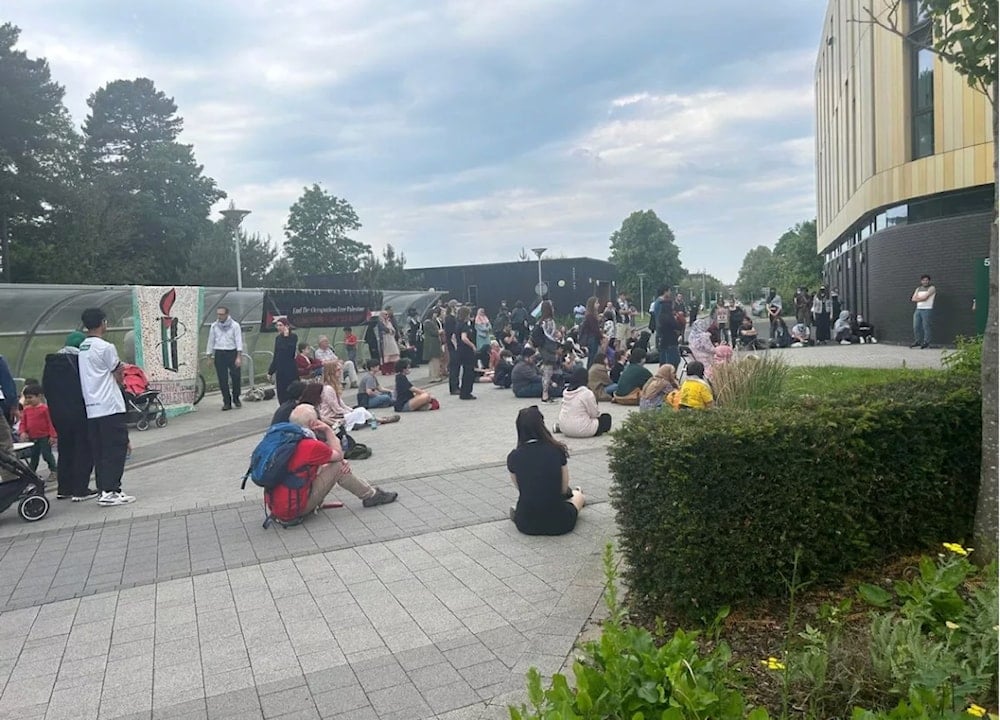
(Source: Nottingham Post)
A camp member spoke about the reaction of students newly learning about the Palestinian struggle:
“There are some [students] I have met through this encampment who knew very little about Palestine prior to October 7th, and this [genocide] has been their introduction. For them this must be difficult. I’m blown away about how difficult it must be. To see a genocide live, broadcast, and what that means for your brain and nervous system – going from knowing nothing to seeing everything.”
UoN administration was quick to react against the encampment. Instead of engaging and opening a dialogue they served a legal notice for the camp’s removal. The camp’s occupants, who at the time had no legal representation, were given two days to prepare their case. Perversely, the camp’s eviction notice was served on May 15th - or Nakba Day.
The legal process continued for several weeks, and on Friday, July 12th 2024, after two months of peaceful protest, the camp was dismantled.
Andreas Bieler, President of the local UCU branch, gave a stinging indictment of the University’s management:
“The fact that management pursued legal action after only four days without prior engagement with the encampment, and that they threatened our students with legal costs is appalling. It demonstrates that management was never interested in constructive engagement but focused on suppressing students’ voices.”
Bieler makes a crucial point – threatening students with financial ruin. I have seen a copy of University of Nottingham’s claim (Claim No: KB-2024-BHM-000107) and it is a crude and menacing document that names a single individual as the defendant. By doing so, the individual would be solely liable for all legal costs, speculated to be around $200,000.
On July 29th the NCLP issued a press release detailing their decision:
“ … treating peaceful protestors like dangerous agitators and dragging us through two months of legal proceedings, the University then attempted to place its legal costs on a single named defendant without adequate prior notice. This blatant disregard of Civil Procedure Rules, was an abuse of power, attempting to intimidate and financially burden us. To protect our fellow student from financial ruin, we have been forced to dismantle the camp in return for the University agreeing to not seek costs. The University's deployment of a personalised threat against one peaceful protestor as a means of suppressing our collective freedom of speech demonstrated a clear effort to intimidate and silence the encampment.”
The Energy is Still Here
“The physical space is gone but the energy is still here. The camp was just one aspect of our campaign. We still have outreach programmes and community actions, and yes, attempts at dialogue with the university’s’ management. We keep going - until Palestine is liberated,” said one of the camp’s former occupants.
UoN has received formal notification from the International Centre of Justice for Palestinians, an independent organisation of lawyers, academics, and politicians, alerting it to possible criminal liability for institutions who are complicit in the Gaza genocide.
The Gulf Coalition Against Normalisation is boycotting UoN, along with 38 other international student and community groups, for its ongoing association of arms companies complicit in the Gaza genocide.
The Advanced Manufacturing building closed for the period of the encampment.
-
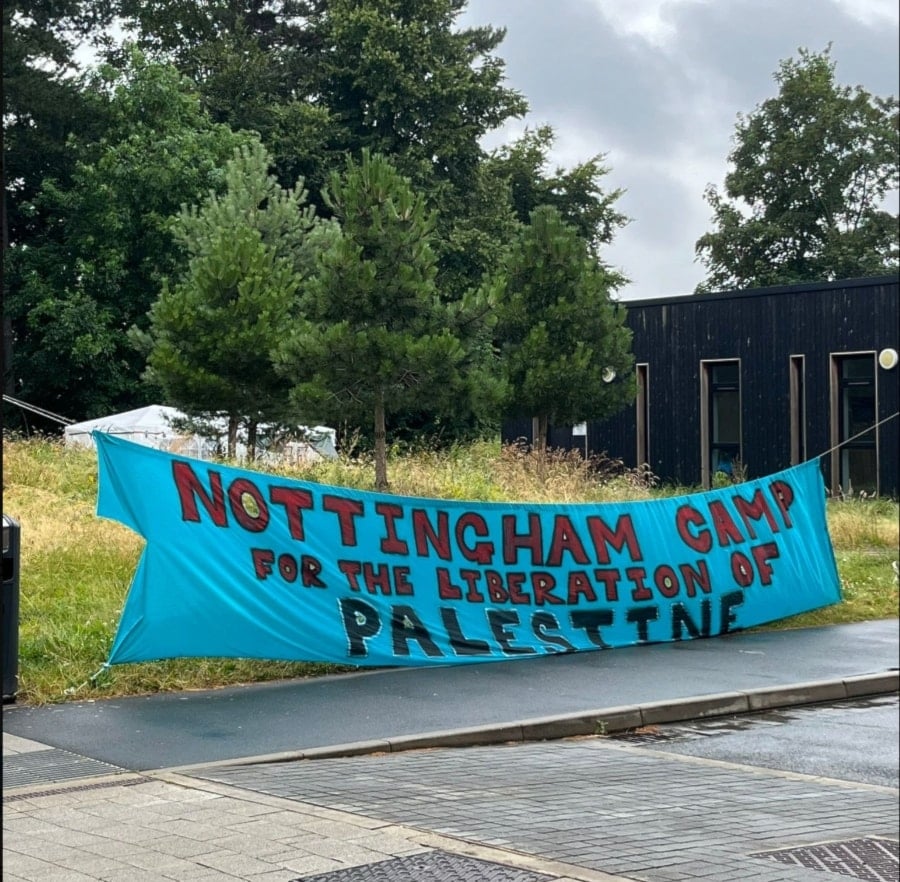
(Source: X Screengrab @drhannahrobbins)

 Sul Nowroz
Sul Nowroz
 10 Min Read
10 Min Read











